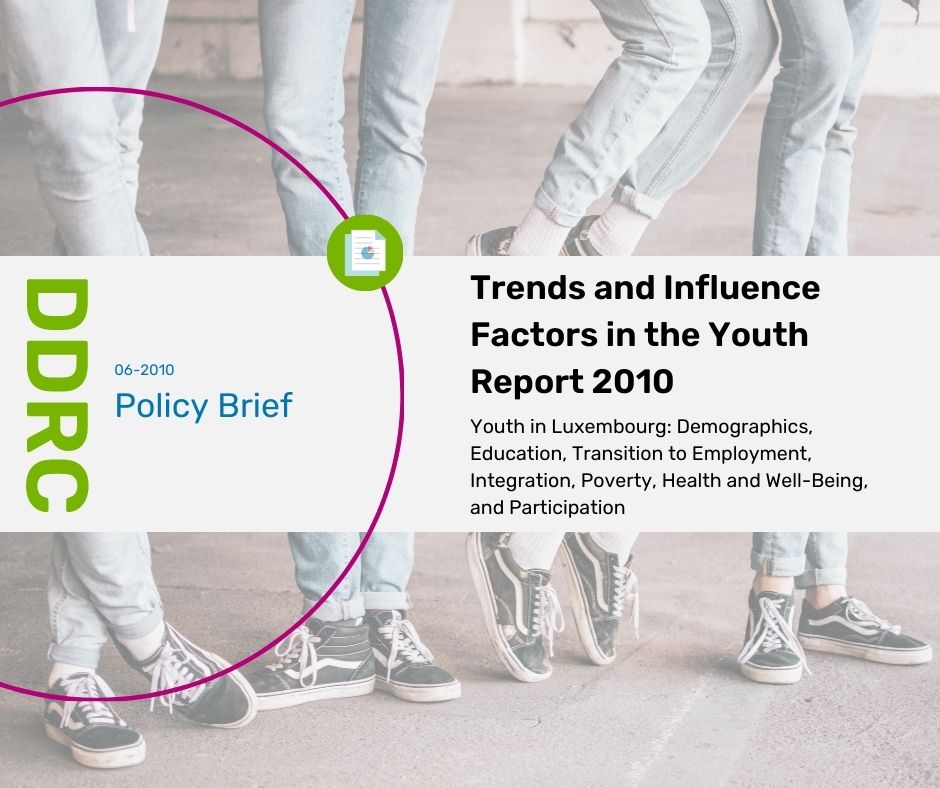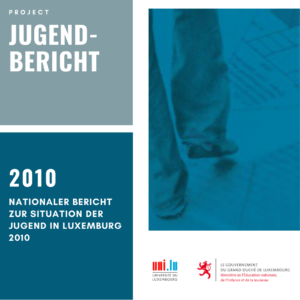The results of the research on the 2010 Youth Report were organized according to various themes: Demographics, Education, Transition to Employment, Integration, Poverty, Health and Well-Being, and Participation. This policy brief provides an overview of the key findings, trends and influence factors in the Youth Report 2010.
Jump to content
Demography
As in many other European countries, the proportion of the elderly population is growing, while the proportion of younger people is declining. Nearly half of Luxembourg’s younger generation is made up of people who do not (yet) have the Luxembourgish nationality and bring with them other cultural and linguistic traditions.
Education
Education is increasingly taking place in out-of-school fields such as youth work, childcare facilities, continuing vocational training or informal learning environments. At the same time, the educational process is expanding to cover the entire lifespan (“life-long learning”). Participation in education and educational success depend strongly on the social background of children and young people. Male adolescents and socially disadvantaged young people (often from immigrant families) are particularly likely to lose out in education. These deficits are not compensated for by out-of-school educational opportunities.
Transition to employment
Transitions from the education system to the labor market are more individualized than in the past and confront an increasing number of young people with risks, uncertainties and problems. Phases of unemployment or of qualification and further training measures are on the rise. The greatest difficulties are experienced by young people without a school-leaving certificate or with low qualifications. Socioeconomic resources and the nationality of the family of origin also play a role. The social status and social position of the parents are reproduced in part by the younger generation.
Integration
Integration deficits persist for many immigrant groups. Although youth work measures seem to be having an effect, clear segmentation tendencies prevail in the educational system and on the labor market. Young people without Luxembourg citizenship are also significantly limited in their opportunities for political participation and are thus not always integrated into the country’s political tradition and democratic culture.
Poverty
Most affected by poverty are single parents, families with children, people with non-Luxembourgish nationality, as well as people who are not fully employed and the low-skilled. Because children from poor families have fewer opportunities in education, they are at increased risk of reproducing their parents’ situation.
Health and well-being
Young people in Luxembourg can be said to be in good physical health compared with other age groups. Nevertheless, as in other countries, an increase in chronic and psychosomatic diseases can be observed. The behavioral patterns of the adolescents indicate that maintaining health does not play a major role for the adolescents themselves. The subjective assessment of health is largely positive.
Participation
Participation in shaping democracy, civil society and the immediate living environment is more pronounced among young people with higher levels of education. In contrast, young people with a migration background in particular face difficulties and hurdles.







